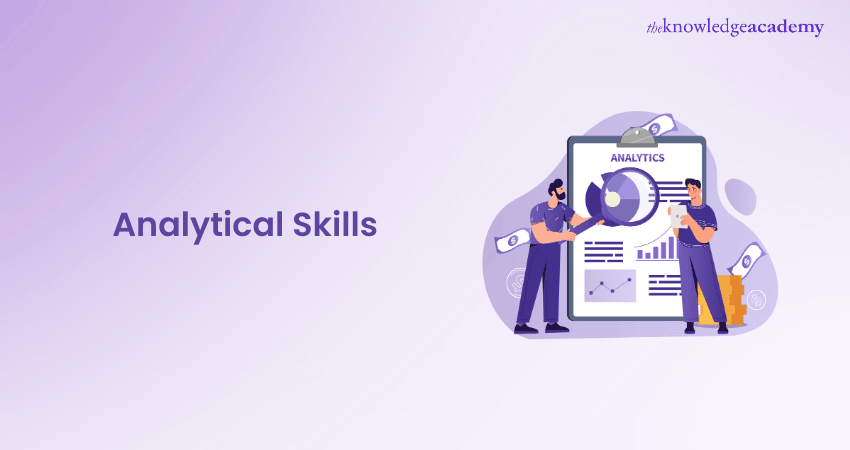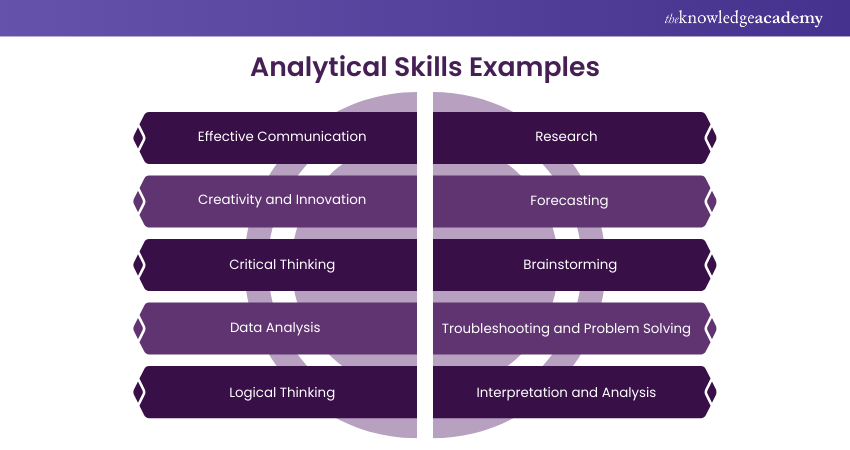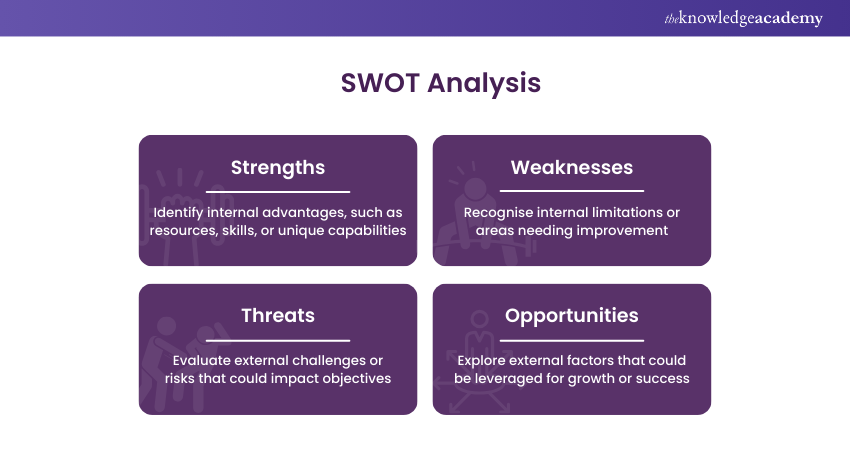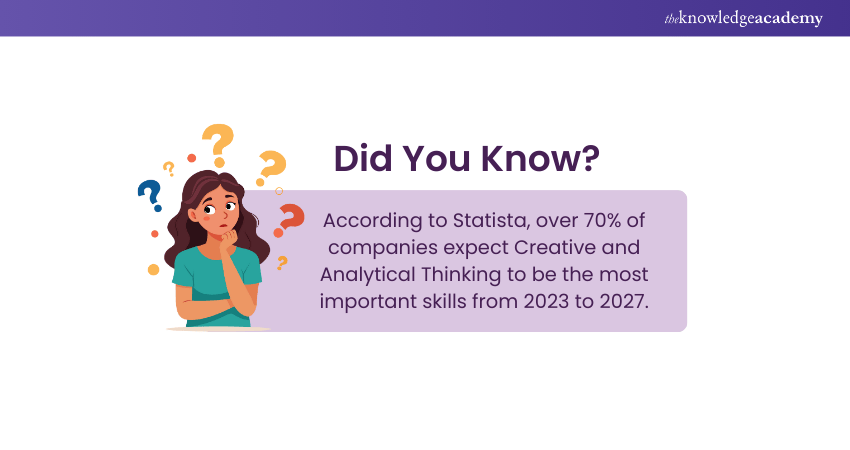We may not have the course you’re looking for. If you enquire or give us a call on 01344203999 and speak to our training experts, we may still be able to help with your training requirements.
We ensure quality, budget-alignment, and timely delivery by our expert instructors.

Have you ever pondered on what truly sets apart successful professionals in the cutthroat competition? In this data-driven world, it is absolutely imperative for one to think rationally, solve problems at ease and make decisions that contribute to the larger picture. The one underlying factor of all these factors is Analytical Skills. These competencies are not directed towards mathematicians or scientists alone but are an integral part of every industry. Whether it is Finance, Marketing, Leadership or Innovation- you name it, is very significant in every industry.
Should you want to learn more on how analytical skills are incorporated in day-to-day work life, how they can transform your life, you have come to the right place! Gear up to be equipped with practical tips on some smart decision-making and pave way to an amazing career trajectory!
Table of Contents
1) What are Analytical Skills?
2) Analytical Skills Examples
3) Why is it Important to Have Good Analytical Skills?
4) Tips to Enhance Your Analytical Skills
5) Conclusion
What are Analytical Skills?
Analytical skills are the ability to identify problems, gather relevant information, and apply logical reasoning to find effective solutions. These skills are highly valued across various fields, particularly in finance, where they are essential for evaluating financial securities.
At its core, analytical thinking allows you to:
a) Examine situations from different perspectives
b) Identify key issues and challenges
c) Use logic and reasoning to form conclusions
d) Make decisions that are informed by data
Having strong analytical skills is fundamental to success in many professions because it empowers you to approach problems systematically and make sound decisions.
Analytical Skills Examples
Analytical skills aren’t just for solving problems - they’re an integral part of making the right decisions in any situation. Here's why they matter:

1) Effective Communication
a) Organises ideas for clarity and impact.
b) Understands and addresses the needs of the audience.
c) Avoids misunderstandings through active listening.
d) Example: Summarising key takeaways after a meeting to align team efforts.
2) Creativity and Innovation
a) Combines logic with imagination to solve problems.
b) Refines raw ideas into actionable strategies.
c) Balances feasibility with ambition in solutions.
d) Example: Creating a new app feature that meets user needs identified through Data Analysis.
3) Critical Thinking
a) Questions existing processes and assumptions.
b) Evaluates risks and benefits logically.
c) Applies lessons from past experiences to current problems.
d) Example: Analysing customer complaints to improve service quality.
4) Data Analysis
a) Simplifies complex datasets for actionable insights.
b) Spots correlations and trends others might overlook.
c) Validates data accuracy before making decisions.
d) Example: Tracking website traffic patterns to optimise online campaigns.
5) Logical Thinking
a) Structures tasks into manageable steps.
b) Applies consistent reasoning across scenarios.
c) Identifies potential pitfalls before acting.
d) Example: Mapping out a project timeline to ensure deadlines are realistic.
6) Research
a) Identifies and utilises credible sources.
b) Synthesises diverse findings into comprehensive insights.
c) Evaluates conflicting information to find the truth.
d) Example: Studying competitor strategies to identify gaps in your offerings.
7) Forecasting
a) Identifies leading indicators for future trends.
b) Balances historical data with changing market dynamics.
c) Provides actionable predictions to minimise risks.
d) Example: Forecasting sales to adjust production schedules.
8) Brainstorming
a) Encourages diverse perspectives for rich idea generation.
b) Prioritises ideas based on impact and feasibility.
c) Refines initial concepts into actionable strategies.
d) Example: Generating content themes based on audience interests and analytics.
9) Troubleshooting and Problem Solving
a) Identifies root causes, not just symptoms.
b) Tests potential solutions before full implementation.
c) Tracks results to ensure lasting resolution.
d) Example: Resolving IT issues by isolating faulty software updates.
10) Interpretation and Analysis
a) Deciphers complex patterns or information.
b) Provides clear summaries for varied audiences.
c) Relates insights back to goals or objectives.
d) Example: Explaining financial data to non-technical team members.
11) Decision-making
a) Considers both short-term and long-term implications.
b) Uses a mix of data, intuition, and consultation.
c) Builds consensus for greater buy-in.
d) Example: Choosing a vendor after evaluating cost, quality, and reliability.
12) Financial Management
a) Tracks financial performance and identifies inefficiencies.
b) Aligns budgets with strategic goals.
c) Anticipates potential financial challenges.
d) Example: Creating cost-saving initiatives after reviewing expenditure trends.
13) Strategic Planning
a) Analyses internal strengths and external opportunities.
b) Develops adaptable, forward-looking plans.
c) Integrates feedback from various departments.
d) Example: Leading a team to create a three-year product roadmap.
14) SWOT Analysis

a) Identifies ways to leverage strengths effectively.
b) Prioritises opportunities for high-impact results.
c) Uses findings to develop mitigation plans for weaknesses and threats.
d) Example: Adjusting a sales strategy based on competitor analysis.
15) Collaboration
a) Synthesises diverse perspectives into unified plans.
b) Resolves conflicts through understanding and compromise.
c) Builds trust and rapport among team members.
d) Example: Facilitating cross-functional collaboration for a major project.
16) Fact-checking
a) Ensures all decisions are based on verified information.
b) Digs deeper into ambiguous or incomplete data.
c) Balances multiple sources to confirm accuracy.
d) Example: Validating financial projections before presenting them to stakeholders.
17) Argumentation
a) Builds persuasive arguments grounded in evidence.
b) Identifies and counters potential counterarguments.
c) Appeals to both logic and emotions for stronger influence.
d) Example: Convincing leadership to approve a new initiative with detailed analysis.
18) Observation and Attention to Detail
a) Spots errors or anomalies quickly and efficiently.
b) Ensures all processes and outputs meet high standards.
c) Identifies improvement opportunities others might miss.
d) Example: Catching an overlooked data entry error that could have skewed reports.
Lead with confidence, inspire greatness, and create a legacy of success by registering for our Leadership Skills Training now!
Why is it Important to Have Good Analytical Skills?
Analytical Thinking Interview Questions highlight the importance of analytical skills in both personal and professional settings, providing individuals with the ability to make informed decisions, solve problems efficiently, and adapt to new challenges. These skills are particularly valuable in leadership, as they drive career growth and help streamline processes for increased productivity. Below are key reasons why analytical skills matter:
1) Transferable Across Positions: Analytical skills are versatile and applicable to various roles, indicating a mindset that prioritises unique factors in different situations.
2) Industry Requirement: Highly developed analytical skills are essential in many professions and industries, including marketing research, management, budgeting, finance, economics, insurance, and stock market analysis.
3) Interpersonal Benefits: Analytical skills are valuable for navigating the interpersonal aspects of a career, such as negotiations, evaluations, training, and team-building exercises.
4) Career Growth: Employers seek individuals with strong analytical skills to enhance company culture and drive growth. Those with expertise in analytical reasoning often have better career advancement opportunities.
5) Opportunity Identification: Analytical skills enable you to identify professional growth opportunities and develop plans to utilise your potential effectively.

Tips to Enhance Your Analytical Skills
Enhancing your analytical skills requires adopting habits that promote critical thinking, problem-solving, and a commitment to continuous learning. Below are practical strategies to help enhance your ability to analyse and make informed decisions:
1) Ask Questions:
Curiosity is the foundation of critical thinking. Asking questions like “why” and “how” helps you dig deeper into problems, uncovering solutions that are more thoughtful and effective.
2) Practice Active Listening:
When you actively listen to others, you gather diverse perspectives that enrich your understanding. This is crucial for analysing situations from multiple angles before making decisions.
3) Engage in Problem-solving Exercises:
Activities such as puzzles, strategy games, or case studies stimulate analytical thinking. They sharpen your ability to spot patterns and think critically under pressure.
4) Break Problems into Smaller Parts:
Tackling challenges can be overwhelming. By breaking problems down into manageable pieces, you gain clarity and prevent feeling bogged down by complexity.
5) Use Data and Evidence:
Base your decisions on solid data rather than gut feelings. This ensures your conclusions are objective and well-supported, making your decisions more reliable.
6) Stay Curious:
Never stop learning. Explore how things work, question assumptions, and seek new knowledge. A curious mind is always ready to analyse new information and adapt to changing circumstances.
7) Collaborate with Others:
Working with others expands your perspective. Engaging in discussions allows you to analyse problems from different viewpoints, leading to richer insights and better solutions.
Master Creative And Analytical Thinking Training Course to elevate your career and ideas!
Conclusion
Analytical Skills are a fundamental asset for success, empowering individuals to solve problems, make informed decisions, and unlock new opportunities. By mastering these transferable skills, you can enhance your career, tackle challenges with confidence, and drive meaningful growth in both your personal and professional life. Start honing your analytical skills today to unlock new opportunities!
Lead with confidence - empower yourself and others through expert Leadership Courses– sign up now!
Frequently Asked Questions
How do I Show my Analytical Skills?

Demonstrate analytical skills by solving problems logically, presenting data-driven insights, making informed decisions, and effectively interpreting information. Showcase them in projects, reports, or discussions where critical thinking and decision-making are key.
What Increases Analytical Skills?

Enhance analytical skills by practising problem-solving, engaging in puzzles or strategy games, analysing data, asking thoughtful questions, and collaborating with diverse perspectives. Continuous learning, research, and applying logical reasoning in real-world scenarios also improve these abilities.
What are the Other Resources and Offers Provided by The Knowledge Academy?

The Knowledge Academy takes global learning to new heights, offering over 30,000 online courses across 490+ locations in 190+ countries. This expansive reach ensures accessibility and convenience for learners worldwide.
Alongside our diverse Online Course Catalogue, encompassing 19 major categories, we go the extra mile by providing a plethora of free educational Online Resources like News updates, Blogs, videos, webinars, and interview questions. Tailoring learning experiences further, professionals can maximise value with customisable Course Bundles of TKA.
What is The Knowledge Pass, and How Does it Work?

The Knowledge Academy’s Knowledge Pass, a prepaid voucher, adds another layer of flexibility, allowing course bookings over a 12-month period. Join us on a journey where education knows no bounds.
What are the Related Courses and Blogs Provided by The Knowledge Academy?

The Knowledge Academy offers various Leadership Courses, including Creative And Analytical Thinking Training, Leadership Skills Training, Practical Thinking Course, Decision Making Course and many more. These courses cater to different skill levels, providing comprehensive insights into Leadership Skills.
Our Business Skills Blogs cover a range of topics related to Analytical Thinking, offering valuable resources, best practices, and industry insights. Whether you are a beginner or looking to advance your Leadership skills, The Knowledge Academy's diverse courses and informative blogs have got you covered.
Upcoming Business Skills Resources Batches & Dates
Date
 Creative and Analytical Thinking Training
Creative and Analytical Thinking Training
Fri 27th Jun 2025
Fri 29th Aug 2025
Fri 24th Oct 2025
Fri 5th Dec 2025






 Top Rated Course
Top Rated Course



 If you wish to make any changes to your course, please
If you wish to make any changes to your course, please


